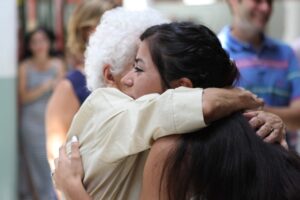
During the last 14 months of the COVID-19 shut-downs, quarantines, and severe restrictions on social interaction, especially for those with dementia, we have all seen the rapid decline of so many individuals and the negative impact the lost weeks, months, year of family and social connection have had on them. Many nursing home and assisted living residents, and even some living alone at home, suffered extreme isolation for over a year without an in-person visit from a loved one and without a single hug. Even the strongest of souls would be hard-pressed to survive such a year intact, let alone thrive, and those with dementia have fared the worst, as thousands upon thousands of families have watched their elderly loved ones decline deeply into dementia and other illnesses. It is time to take a proactive and serious approach to re-engaging those who have suffered so much isolation during the pandemic and consider how to do it differently should the pandemic continue or another one come along.
There is a substantial amount of research that points to social engagement and cognitive stimulation as improving quality of life and well-being for those with dementia, as well as improving communication and social interaction. In fact, the effects of meaningful and positive social connection and cognitive engagement often have positive effects over and above those of any medication. As part of a holistic approach to dementia care, it is critical to provide meaningful social connection as well as purposeful engagement and cognitive stimulation, especially when centered on the individual’s preferences, history, and interests. (Read more here: https://stantonagingsolutions.com/concierge-connection-care/). We know that even the aging brain can form new neural connections, learn new information, and even those with dementia can engage with and enjoy many of the same social and cognitive activities that they once enjoyed. We also know that the opposite is true: that when it comes to cognitive function, the “use it or lose it” adage applies, and without social interaction, an individual is victim to a host of negative outcomes. According to the CDC,
- Social isolation significantly increases a person’s risk of premature death from all causes, a risk that may rival those of smoking, obesity, and physical inactivity.
- Social isolation is associated with about a 50% percent increased risk of dementia.
- Loneliness is associated with higher rates of depression, anxiety, and suicide.
(CDC, “Loneliness and Social Isolation Linked to Serious Health Conditions,” April 29, 2021).
In addition, according to NIH, engaging older persons with dementia in appropriate and meaningful activities has been shown to yield beneficial effects such as increasing positive emotions, improving activities of daily living (ADL) and improving the quality of life (NCBI, NIH, “Engagement in persons with dementia: the concept and its measurement”, Jiska Cohen-Mansfield, Ph.D., ABPP,1,2,3 Maha Dakheel-Ali, M.D., and Marcia S. Marx, Ph.D.).
It is not only important to provide social connection and stimulating activities for our elderly loved ones – it is ESSENTIAL. Humans are designed as social beings, and quality social relationships can help us and those we love to live longer, healthier lives.
If you or a loved one is in need of social connection and purposeful, meaningful activities, please contact us. We can help! https://stantonagingsolutions.com/immediate-geriatric-care-needs/
By Jeannie Finnegan, CDP, Elder Care & Dementia Care Consultant

Leave a Reply
You must be logged in to post a comment.